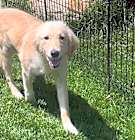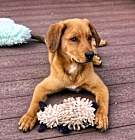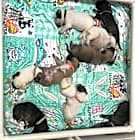Yes, Newfoundland dogs have webbed paws. The webbing between their toes is akin to wearing flippers while snorkeling, offering enhanced propulsion and maneuverability in the water. The Newfoundland’s webbed paws make them excellent swimmers, well-suited for water rescue and retrieving objects from the water.
Newfoundland
Breed Type: Working
Common nicknames: Newfie, The Gentle Giant
Coat: Double
Hypoallergenic: No, they will likely trigger allergies.
Temperament: Gentle, affectionate, intelligent, eager-to-please
Life expectancy: 7-11 years
Color & patterns:

Don’t let their size fool you — though male Newfoundlands typically reach heights of 28 inches and weigh up to 150 pounds, they are as friendly and affectionate as they come. These pups are known for their thick, water-resistant coats (which can be black, brown, and white-and-black), webbed feet, and strong swimming abilities. In fact, Newfoundlands were originally bred as working dogs for fishermen, rescuing people who had fallen overboard or hauling nets filled with fish. Nicknamed the “Newfie,” this breed is a great family dog known for their patience and love of children. With their big, soulful eyes and trademark drool, they’re sure to steal your heart. So, if you’re ready for a cuddly companion who will always be up for a swim, consider adding a Newfie to your family.
Newfoundland characteristics
Learn about about Newfoundland basics like their fur colors, shedding levels, how much grooming they need, and other Newfoundland facts.
Average height
26-28 inches (66.0-71.1cm)
Average weight
86-163 pounds (39.0-73.9 kg)
Average lifespan
7-11 years
Exercise needs
Grooming needs
Full-grown size
Good with cats
Good with kids
Training aptitude
Can you shave a Newfoundland?
No, you can’t shave a Newfoundland. Well, you technically can, but it’s not recommended. The Newfoundland’s thick double coat serves as insulation and helps regulate their body temperatures in both hot and cold weather. Shaving their coat disrupts this natural insulation and could lead to potential skin issues, sunburn, and other problems. If you’re concerned, consult with a professional groomer or veterinarian for advice on how to properly care for a Newfoundland’s coat without resorting to shaving.
Do Newfoundlands shed?
Yes, Newfoundlands shed. Their thick, waterproof double coat sheds year-round, with heavier shedding occurring during seasonal changes. Daily brushing will help remove loose fur and maintain a healthy coat. A balanced diet and proper hydration also play roles in a healthy coat and can reduce excess shedding.
How big do Newfoundlands get?
Newfoundlands are a giant breed of dog, with males reaching an average height of 28 inches at the shoulder and weighing between 130 and 150 pounds. Females Newfoundlands are slightly smaller, standing an average of 26 inches tall and weighing between 100 and 120 pounds. Their commanding, impressive size is one of the defining characteristics of the breed.
How long do Newfoundlands live?
The lifespan of a Newfoundland is generally nine to 10 years. The life of every individual dog is unique, however, and some Newfoundlands may live longer given proper care and attention to their health. Newfoundlands need consistent exercise, a balanced diet, and regular veterinary check-ups to help ensure a long and healthy life.
When do Newfoundlands stop growing?
Newfoundlands reach their full adult size between 18 months and two years of age. They will continue to develop muscle mass until they are about three years old. During their growing years, it’s important to provide them with proper nutrition and exercise to support their healthy development.
Newfoundland history
Learn about where this Newfoundland came from!
What were Newfoundlands bred for?
Newfoundlands were originally bred to work with fishermen in Atlantic Canada to help haul nets and rescue people who had fallen overboard. Their commanding size, physical strength, and natural swimming talents made them well-suited for work aboard seafaring ships. With their calm and grounding natures, Newfoundlands are still used in water rescue operations today. These gentle giants are now also popular as family pets due to their kind and loyal temperaments.
Where are Newfoundlands from?
Newfoundlands are from, yes, Newfoundland, Canada. The country’s easternmost province is home to a world-renowned cod fishery, an industry aided by the strength and agility of the seafaring Newfoundland breed, also called “Newfies.”
Newfoundland temperament
Learn about about the Newfoundland temperament and how well they fit into your lifestyle, home environment, and family.
Are Newfoundlands good with kids?
Yes, Newfoundlands are great with kids. Newfoundlands form strong, protective bonds with their human family members and have loving and affectionate temperaments, making them excellent companions for children. Patient and low-key, these gentle giants are relatively tolerant of rough play (and other activities another breed might fight irksome).
That said, teaching children how to properly approach and handle dogs is crucial to ensure positive experiences for both the dog and the child. And, like all dogs, Newfoundlands need to be trained to behave gently with children. As with any breed, supervise interaction to keep both the child and dog safe.
Are Newfoundlands good dogs?
Yes, Newfoundlands are good dogs. Newfoundlands are famously gentle with sweet and affectionate temperaments. Newfoundlands are great with families and are typically good with other pets as well. They are also known for their intelligence and willingness to please, making them relatively easy to train. Additionally, their size and strength make them excellent working dogs for tasks such as water rescue. Overall, Newfoundlands are often described as loving, gentle giants and make wonderful companions for many households.
Are Newfoundlands protective?
Yes, Newfoundlands are protective of their family members. Though gentle and sweet-natured, their intense loyalty makes them watchful guardians, especially around children. The Newfoundland’s size and presence alone can act as a deterrent to potential threats.
Do Newfoundlands bark a lot?
No, Newfoundlands do not bark a lot. This laid-back breed may be quieter due to their generally calm and friendly dispositions. Like all dogs, individual personalities vary based on their environment, training, and socialization. In general, Newfoundlands are not excessive barkers.
Are Newfoundlands good with cats?
Yes, Newfoundlands are generally good with cats, given their gentle natures. Cats, on the other hand, may be intimidated by the sheer size of the giant Newfoundland. If properly socialized and introduced to each other in a gradual and supervised manner, Newfoundlands and cats can coexist peacefully in the same household.
Are Newfoundlands good with other dogs?
Yes, Newfoundlands are good with other dogs. Friendly and social, Newfoundlands enjoy the company of other dogs. As with any breed, proper socialization and training are important to ensure positive interactions with other dogs. Supervise their interactions and introduce your Newfie to new dogs in a controlled and gradual manner to prevent any potential conflicts.
Are Newfoundlands smart?
Yes, Newfoundlands are smart. In addition to their intelligence, Newfoundlands possess a strong work ethic and a desire to please their pet parents.
Are Newfoundlands good apartment dogs?
No, Newfoundlands are not good apartment dogs. This giant breed needs space to move around comfortably, as well as plenty of room to stretch out and exercise. They also tend to drool and shed quite a bit, which may not be ideal for apartment living. However, if their activity needs are met, and their path free of all things fragile, an apartment home could be good for a Newfoundland given their laidback natures.
Are Newfoundland dogs friendly?
Yes, Newfoundlands are very friendly and sociable dogs who love to be around people as well as other animals.
Are Newfoundland dogs good for first-time pet parents?
Yes, Newfoundlands are good for first-time pet parents due to their gentle and friendly natures. They are an extra-large breed that requires regular grooming and exercise, so first-timers should consider if they have the time and resources to properly care for them. With commitment and understanding, Newfoundland dogs make a wonderful choice for first-time pet parents.
Are Newfoundlands stubborn?
No, Newfoundlands are not stubborn. While they can be independent, they’re known for their sweet temperaments, devotion, and eagerness to please their parents.
Are Newfoundlands easy to train?
Yes, Newfoundlands are easy to train, given their intelligence and eagerness to please. However, training any dog takes substantial time and effort, regardless of breed, and individual temperament and personality will play a role in how quickly they pick up on training. Consistent positive reinforcement and patience are key when training a Newfoundland.
Newfoundland health
Learn about about the Newfoundland health outlook and what diseases they may be prone to at various stages of their life.
Are Newfoundlands healthy?
Newfoundlands are healthy dogs and a sturdy, hardy breed, though they are prone to certain issues:
Hip and/or elbow dysplasia: Hip and elbow dysplasia are two of the most common skeletal diseases seen in dogs. They are similar diseases in which either the hip or elbow joint has grown abnormally or is misshapen. The abnormal shape prevents the joints and sockets from adequately meeting one another, resulting in rubbing and grinding instead of sliding smoothly. Though the main complication with hip dysplasia is joint instability, the abnormalities present in elbow dysplasia often result in pieces of bone and/or cartilage breaking loose and irritating the joint tissues. Over time, the rubbing from dysplasia can cause a variety of issues, such as pain, lameness, and secondary osteoarthritis. Surgery can be done to fix the joint if diagnosed before the onset of arthritis.
Subaortic stenosis: Subaortic stenosis is an inherited heart condition that is most common in larger breed dogs and is present at birth. It occurs when a dog is born with an abnormally narrow aortic valve, which controls blood flow from the left ventricle to the aorta. The narrowing makes it difficult for blood to flow properly through the heart and can cause fainting and even sudden death. Your vet can detect it and prescribe the proper treatment.
Cranial cruciate disease: The cranial cruciate ligament is an important stabilizer in the knee joint. Cranial cruciate ruptures cause joint instability and are the most common cause of hind leg lameness in dogs. Surgery is recommended to prevent the tear from progressing to more severe joint disease.
Wobbler’s syndrome: More formally known as “cervical vertebral instability,” this condition is suspected to be genetically passed down in Newfoundlands. Dogs affected by wobbler’s syndrome suffer from a malformed spinal canal or instability of the cervical vertebrae. Extreme symptoms are neck pain and paralysis of the legs, but not all dogs are seriously affected. Surgery is available as a treatment option, though the condition recurs in some dogs.
Eye issues: Newfoundlands may develop cataracts, a common eye condition that causes cloudiness in the eye and obstructs vision, and cherry eye, a condition where a gland on the lower eyelid known as the third eyelid pops out and swells causing a red oval mass on the inner corner of the eye.
Cystinuria: Cystinuria is an inherited kidney defect in which the amino acid cystine is not properly filtered by the kidneys. The body does not properly reabsorb cystine and causes kidney and bladder stones. If the stones are left untreated they can create fatal urinary blockages. Symptoms of cystinuria are similar to a regular urinary tract infection and include frequent attempts to urinate without much coming out and blood in the urine.
Others: Newfoundlands may also develop gastric dilatation-volvulus, a sudden, painful, and life-threatening swelling and twisting of the abdomen; epilepsy; and cardiomyopathy, a heart condition that causes an enlarged heart and could lead to heart failure and cancer.
Are Newfoundlands hypoallergenic?
No, Newfoundlands are not hypoallergenic. They have a thick double coat that sheds seasonally, which can trigger allergies. Regular grooming and cleaning can help reduce the amount of loose fur and dander in the environment, which can minimize allergic reactions.
Do Newfoundlands drool?
Yes, Newfoundlands drool a lot. Their large jowls and heavy, droopy lips can lead to excessive drooling, especially after eating or drinking. Keep a towel handy to wipe their mouths and keep them clean and comfortable.
Can Newfoundlands live in hot weather?
Yes, Newfoundlands can live in hot weather, but their thick double coat makes them prone to overheating in hot weather. Newfoundlands are happiest and best suited to cooler climates. In warmer temperatures, provide them with plenty of shade, fresh water, and a cool environment to escape the heat. Managing their coat with regular grooming will also prevent overheating.
Popular Newfoundland mixes
Some common Newfoundland mixes include:
Bernefie (Newfoundland + Bernese Mountain Dog)
Golden Newfie (Newfoundland + Golden Retriever)
Newfypoo (Newfoundland + Poodle)

Find Newfoundland puppies near you
Adopting a Newfoundland
We don't see any Newfoundlands available for adoption in your exact location or cities near you, but here are some adorable similar breeds in Columbus, OH.

Cutter (Baseball Litter '25)
Great Pyrenees
Female, 5 mos
New Albany, OH
Not good with dogs
Not good with cats

Chevy (Simpsons Litter)
Bernese Mountain Dog
Male, 5 mos
New Albany, OH
Good with dogs
Not good with cats
Spayed or Neutered
Shots are up-to-date

Flopsy
Great Pyrenees
Male, puppy
Columbus, OH
Not good with dogs
Not good with cats

Cadbury
Great Pyrenees
Male, puppy
Columbus, OH
Not good with dogs
Not good with cats

Cottontail
Great Pyrenees
Male, puppy
Columbus, OH
Not good with dogs
Not good with cats

Marshmallow
Great Pyrenees
Female, puppy
Columbus, OH
Not good with dogs
Not good with cats

Chicadee
Great Pyrenees
Female, puppy
Columbus, OH
Not good with dogs
Not good with cats

Peter
Great Pyrenees
Male, puppy
Columbus, OH
Not good with dogs
Not good with cats

Cutter (Baseball Litter '25)
Great Pyrenees
Female, 5 mos
New Albany, OH
Not good with dogs
Not good with cats

Chevy (Simpsons Litter)
Bernese Mountain Dog
Male, 5 mos
New Albany, OH
Good with dogs
Not good with cats
Spayed or Neutered
Shots are up-to-date

Flopsy
Great Pyrenees
Male, puppy
Columbus, OH
Not good with dogs
Not good with cats

Cadbury
Great Pyrenees
Male, puppy
Columbus, OH
Not good with dogs
Not good with cats

Cottontail
Great Pyrenees
Male, puppy
Columbus, OH
Not good with dogs
Not good with cats

Marshmallow
Great Pyrenees
Female, puppy
Columbus, OH
Not good with dogs
Not good with cats




